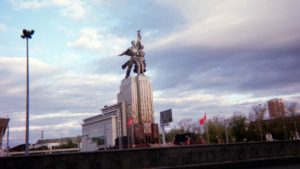
Based on statistics recently released by Russia’s government statistical agency, Rosstat, and the Russian Central Bank, analyst Alexander Mercouris writes that Russia’s current rates of inflation and unemployment are at healthy lows. Moreover, very modest growth is expected for the rest of the year and into 2017 and 2018, with growth expected to tick up closer to an annual rate of ~4% in 2019:
Contrary to the Central Bank’s earlier predictions the annualised rate of inflation remained steady in June despite claims that it would go above 8% because of the base effect. The annualised rate of inflation at the end of June instead turned out to be 7.4% compared to 7.3% in the previous months. The true rate of inflation after eliminating all statistical anomalies remains rock steady at 0.1% per week (between 5 – 6% for the whole year) where it has been for months. The Central Bank is now admitting that there will probably be deflation in August – a month when inflation in Russia traditionally falls – and that the annualised rate of inflation for the whole year could be as low as 5.5%. The Economics Ministry more pessimistically predicts 5.9%.
….Meanwhile the Central Bank is now also predicting growth in the second and third quarters whilst unemployment – perhaps the strongest single indicator of the state of the economy – fell from 5.9% in April to 5.6% in May – the lowest for 7 months. Meanwhile PMI for manufacturing in June stood at 51.5 – up from 49.6 in May – with any figure above 50 pointing to expansion and any figure below 50 pointing to contraction. This is the best PMI outcome for 20 months, and is a further strong indicator of recovery.
Finland, which shares a long border with Russia, is not a member of NATO, and had essentially a neutral status during the Cold War. However, there have reportedly been attempts made since the Ukraine crisis to get Finland to take a harder stance against Russia and perhaps to even consider joining NATO, even though a majority of Finns do not want to join the alliance and wish to continue important trade relations with their big neighbor to the east. With respect to potential membership of Finland in NATO, Putin said the following at a post-meeting joint press conference, according to Reuters:
Finnish armed forces “would become part of NATO’s military infrastructure, which overnight would be at the borders of the Russian Federation”, Putin said after meeting Finnish President Sauli Niinisto.
“Do you think we will keep it as it is: our troops at 1,500 (kilometers, 900 miles) away?”
“NATO perhaps would gladly fight with Russia until the last Finnish soldier,” Putin said.
“Do you guys need it? We don’t. We don’t want it. But it is your call.”
Journalist Lee Fang reports over at The Intercept, that hacked emails from the Gmail account of retired NATO General Philip Breedlove, show that he actively sought out academics and other high-ranking military officers, such as Colin Powell and Wesley Clark, to help him persuade president Obama to escalate the Ukraine crisis by sending weapons to the coup government in Kiev.
“Given Obama’s instruction to you not to start a war, this may be a tough sell,” [The Atlantic Council’s Harlan] Ullman replied a few months later, in another string of emails about Breedlove’s effort to “leverage, cajole, convince or coerce the U.S. to react” to Russia.
….Phillip Karber, an academic who corresponded regularly with Breedlove — providing him with advice and intelligence on the Ukrainian crisis — verified the authenticity of several of the emails in the leaked cache. He also told The Intercept that Breedlove confirmed to him that the general’s Gmail account was hacked and that the incident had been reported to the government.
Hi Natylie. Thank you for this report.
Question: Is the low unemployment rate in Russia due to the strong construction activity on the New Silk Road?
Hi Daniel. That’s a good question. I don’t have exact figures on jobs that might be associated with that, but at this point, my educated guess would be that any employment on that would not be significant enough to affect the overall unemployment rate. The stable unemployment rate is mostly from 1) attempts to keep people in their jobs as much as possible through the recession – sometimes that means wages are being paid late or that hours have been cut back to compensate for not laying people off, and 2) import substitution, particularly in the area of agriculture.
great post
Well. I compliment Russia and its People on whatever success they have achieved to keep their economy as stable as possible. our World needs these good examples to follow.